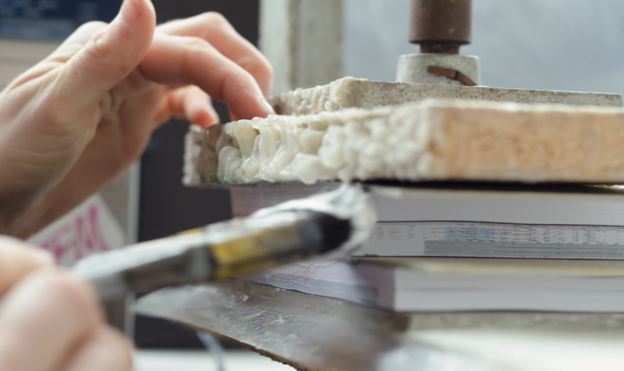
When Amanda Judd realised how much paper waste her company was creating, she came up with a way to upcycle it. The result? Lovenotes: designer stationery – with a difference.
Stationery captivates. There’s something about the crisp white page that both invites ideas and suggests those ideas might be better than the ones you had before.
But recycled stationery doesn’t bring to mind the same psychological benefits. Once you’ve used a page, there’s no point flipping it over to write on the other side – all the magic’s gone.
 That’s until Amanda Judd gets her hands on it. Her business, Lovenotes, takes paper that has been used on one side, collates it, trims and binds it into stylish notebooks of different shapes and sizes featuring covers designed by local artists. You can only write on one side of the paper; the other provides rather fragmented reading depending on where the paper’s from.
That’s until Amanda Judd gets her hands on it. Her business, Lovenotes, takes paper that has been used on one side, collates it, trims and binds it into stylish notebooks of different shapes and sizes featuring covers designed by local artists. You can only write on one side of the paper; the other provides rather fragmented reading depending on where the paper’s from.
Judd calls this service ‘Refresh’, and so far she’s got 51 Auckland businesses on board, from Auckland Council and OfficeMax to Auckland Zoo. So far, 303,750 pages have passed through Lovenotes’ system, saving about 10 litres of water per page – more than three million litres in total. About half the stationery Judd produces is ‘tailored’ with custom or branded covers, created by Lovenotes’ on-call smorgasbord of designers and artists. The result? Notebooks and journals that capture the crisp-white-page effect – they even smell new.
It all started in Judd’s previous job – she crowned herself the sustainability officer of her small company and started collecting up paper used only on one side.
“The rule was nothing was allowed to leave the office until it had been printed on both sides,” she says. But her office couldn’t get through it as fast as they generated it, and soon there were seven boxes of one-sided paper stashed in the stationery cupboard.
Lesser humans might have sighed in frustration and biffed the lot in the recycling. “I took the boxes of paper to my dad’s print actory, turned them into stationery, took them back to work and handed them out,” says Judd. Voila? – new notebooks for almost nothing, a useless material transformed into a useful one, and empty shelves in the cupboard. Judd promptly quit her job to figure out how she could get larger businesses to hire her to upcycle their paper and return it to them for a second life.





That was five years ago. 2013 saw Lovenotes collaborate with TEDx Auckland on stationery – “They collected waste paper from their sponsors and we refreshed it into 700 notebooks for them” – and Auckland artist Ruby Watson on a live art installation. Watson also designed Lovenotes’ most recent set of covers, which change every six months. Just in time for Christmas, Lovenotes also launched a new product, SeedCards – greeting cards made from recycled paper embedded with seeds. Plant one in your garden and it’ll grow into either basil, rocket or cress.
“We wanted to explore how we could create solutions at the crazy Christmas time of the year when so much waste is generated,” says Judd. “Waste doesn’t exist with this product. It’s made from 100 percent recycled paper collected from our partners. The packaging is PLA plastic that can be home composted. We wanted to put the cradle-to-cradle concept into people’s hands in a tactile way.”
SeedCards sold a quarter of its print run by September with no marketing; Judd was expecting to sell all 5,300 cards well before Christmas.

Lovenotes doesn’t really function like the average business. Take its production system, for example. Paper is sorted and staples removed for free by a group of ‘paper jammers’ on Tuesday nights. These weekly sessions are part working bee, part discussion group, part counselling session, featuring volunteers from young to old.
“It’s a really therapeutic task,” Judd insists.
Another branch of Lovenotes runs workshops in schools, bringing the concept of upcycling to life for students of all ages and raising the question of what happens to rubbish after you’re done doodling all over it. Judd piloted the programme in 2012 and has run “a handful” of workshops since. Although she’s had plenty of interest, the obstacle is “which line in the budget the funding comes from”.
Getting people thinking about the world around them is Lovenotes’ raison d’e?tre. Judd has noticed that many people who start asking questions around issues of sustainability often find themselves feeling isolated and ineffective.
“It’s hard to find answers to many questions when you don’t have the community or the support around you,” she says. “Developing the community in itself – that’s what we’re most excited by. We’re not here to create stuff and figure out how to sell it and market it afterwards – we’re here to respond to the needs of our community.”
 ?
?
 ?
?
Lovenotes’ product is a tactile demonstration of Judd’s set of values – the perfect show-and- tell prop for why it’s worth paying attention to where things come from and where things go.
“When people try [Lovenotes] out, all that invisible stuff, the social and environmental stuff, becomes so much more clear to them.” And it’s obvious that Judd’s real passion involves being the lightbulb moment for other people. “You get some stationery and save some money – but that’s the least of it.”




